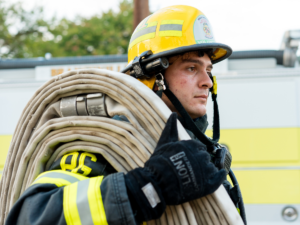The Importance of Getting Help Early to Stay Strong for Yourself, Your Family, and Your Department
September 5, 2023
By Thomas Britt
Reprinted from Firefighter Strong
 Firefighters are regularly exposed to potentially traumatic events, including difficult fire casualties, automobile accidents, various medical emergencies, and natural disasters, in addition to operational stressors of high workload, shiftwork, and time pressure. These types of stressors have the potential to result in firefighters developing mental health problems that if left untreated can result in secondary problems such alcohol and drug abuse, as well as family consequences, including divorce. Studies show that firefighters are at an increased risk for mental health problems such as post-traumatic stress disorder because of events they encounter doing their duty compared to the rest of the general population.
Firefighters are regularly exposed to potentially traumatic events, including difficult fire casualties, automobile accidents, various medical emergencies, and natural disasters, in addition to operational stressors of high workload, shiftwork, and time pressure. These types of stressors have the potential to result in firefighters developing mental health problems that if left untreated can result in secondary problems such alcohol and drug abuse, as well as family consequences, including divorce. Studies show that firefighters are at an increased risk for mental health problems such as post-traumatic stress disorder because of events they encounter doing their duty compared to the rest of the general population.
Importantly, firefighters are embedded in highly cohesive departments that work together to accomplish difficult mission objectives. Therefore, firefighters are highly responsive to evaluations and feedback from their fellow department members and leaders. Furthermore, firefighters often have the expectation that they will remain resilient in the face of stressors they encounter so they can face the next challenge with their department. All of these factors can create an environment where firefighters are hesitant to seek help for problems that develop because of the stigma involved in both admitting one has a problem and then getting treatment for that problem.
Facing Down Stigma
Firefighters may experience three types of stigma surrounding recognition and treatment for mental health difficulties. The first is career-related stigma where they are worried that if they admit a mental health problem and get treatment for that problem their career will be negatively impacted in some way, either through a poor performance evaluation or not being able to get a desired position. The second type of stigma involves how the firefighter will be treated by his or her peers and leaders, such as being viewed negatively or not selected for difficult tasks. The third type of stigma might be the most important and that is self-stigma. Because of the expectations for resilience under even extreme stress, firefighters might not want to admit to themselves that they have a problem because they might feel like they’re weak or not able to handle problems on their own.
Importantly, those in high-risk occupations, like firefighters, who get mental health treatment when their problems are relatively minor are likely to remain more resilient than those who wait for symptoms to interfere with their performance and well-being prior to getting help. Studies suggest that for employees experiencing high levels of stress following difficult work events, getting help within a month following the event can reduce the likelihood of a longer-term mental health problem. In a study involving military personnel, those who made the decision to get mental health treatment on their own did not experience any negative career outcomes. It is only when symptoms get worse and end up affecting mission-related performance that negative career outcomes can occur.
In terms of the potential concern of being treated differently by fellow department members for getting help, the climate surrounding psychological health in the department can have a major impact on firefighter perceptions. Firefighters embedded in departments that stigmatize and devalue mental health concerns are likely to report increased stigma for getting treatment and a stronger preference for
trying to handle problems themselves. In addition, a negative climate for mental health may discourage the firefighter from reaching out to fellow department members when experiencing a problem or getting help from a mental health professional.
However, if firefighters believe they are embedded in departments that back the use of mental health treatment to address problems that are harming the performance or personal well-being of the firefighter, perceptions of stigma will be lower and beliefs about mental health treatment will be more positive. Firefighters should also be more likely to reach out to fellow department members for help and to seek treatment from a professional if necessary. In fact, studies with military personnel suggest that a more positive department climate for mental health is associated with a reduction in stigma over time.
A positive climate for mental health within the firefighter’s department should also help reduce the self-stigma associated with admitting a problem and getting treatment. Normalizing the difficulties that can occur following potentially traumatic events communicates to firefighters that recognizing symptoms they experience should not be interpreted as a lack of resilience on the part of the firefighter, but rather as the first step in taking action to improve one’s mental health in order to benefit the firefighter, their family, and their department.
Recognizing When It is Time to Get Help
Given the different types of stigma that may exist for admitting a problem and getting treatment for that problem, and the expectations for resilience, those in high-risk occupations may have a preference for self-reliance, or handling problems themselves. The use of self-reliance to address symptoms is fine if firefighters are able to successfully address the symptoms through their own coping strategies, such as seeking social support or help from fellow unit members. However, the use of self-reliance becomes problematic when it is not working, as indicated by the problem getting worse and negatively affecting the firefighter and their family.
To use an analogy involving physical symptoms, if you sprain your ankle, you may be able deal with it on your own by icing it and resting it. If you’ve sprained your ankle severely, you may try to address it, but it keeps hurting more. Then you may need to go to the doctor for professional help to treat it.
Because of the highly cohesive nature of firefighter departments, it is important that peers and leaders receive training in recognizing mental health symptoms, supporting firefighters, and recommending treatment when necessary. The International Association of Fire Fighters and National Volunteer Firefighter Council have a number of training programs that prepare all firefighters to be sources of support for fellow department members showing signs of struggle. Studies show these programs are effective at increasing utilization of behavioral health by firefighters. Ultimately, fire departments themselves are in the best position to get their firefighters the help they need.
Dr. Thomas Britt is a professor of psychology and the Prisma Health Sciences Center research director at Clemson University. He is also the editor-in-chief of the journal Military Psychology. He received his Ph.D. from the University of Florida in social psychology before serving active duty in the U.S. Army as a research psychologist from 1994-1999. His current research programs investigate how meaningful work, coping strategies, and other factors promote resilience among employees in high stress occupations, and how stigma and other barriers to care influence employees in high stress occupations seeking needed mental health treatment.



